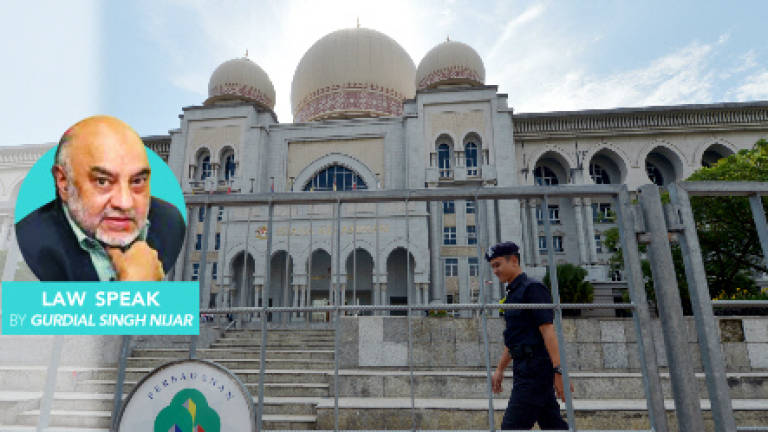A cautionary plea

ONCE again, a grey cloud is hovering over the judicial arm of government. It relates to the recent announcements by the Prime Minister's Office of the appointment of the sitting chief justice (CJ) and president of the Court of Appeal (PCA) as additional judges; and then their appointment to continue in their posts for three and two years respectively.
Step 1: Their appointment as "additional judges" was made by the former CJ on the eve of his retirement on March 30, 2017. They are both sitting judges. And the appointments are to take effect upon (and beyond) their mandatory retirement age (66 years plus six months).
Step 2: After their additional appointment, the PM has already announced their appointment as CJ and PCA respectively. And this will take effect on different dates upon their retirement. This "extension" of their high office was by the Yang di-Pertuan Agong on the advice of the prime minister, which advice the king is obliged to follow under Article 40(1) of the Federal Constitution. The Conference of Rulers need only be consulted – meaning that their position on the matter is not binding. And on existing authority, even if they have not given their views, which may (or may not) be the case, the PM can proceed regardless.
All very extraordinary and unprecedented events.
There is grave disquiet as to the propriety and even constitutionality of these moves by the Malaysian Bar (which has scheduled an extraordinary general meeting to discuss this); and by political parties, litigants and members of the public. Exacerbating the issue is the fact that the PM is himself embroiled in cases which will fall eventually to be decided by the Court of Appeal and the Federal Court – the courts of these judicial personages.
Now, the higher judiciary – the Court of Appeal and the Federal Court – are mandated to arbiter matters involving constitutional issues. Their integrity must not only be intact but be perceived to be uncontaminated by even the slightest slur.
Herein lies the rub.
By any serious reckoning, these appointments – rightly or wrongly – place the judiciary and these appointments at the centre of what may turn out to be a raging and protracted controversy. Plainly speaking, potentially highly contentious. The problem that may arise is – these appointees – whose record thus far has been exceptional and even exemplary in the discharge of their high office – may see their glorious past sullied somewhat.
My fear is that instead of sailing out into the sunset upon retirement at the zenith of their distinguished careers, as they richly deserve – they may henceforth suffer the opprobrium of those who hold them in high esteem.
If the past is anything to go by – and lawyers almost always swear by the precedent value of cases already decided – then Lord President Tun Hamid Omar's judicial career was marred at the end by the utter disdain of the legal profession for sitting in judgment over his predecessor, then Lord President Tun Salleh Abas. And then coveting the post for himself after duly dismissing Tun Salleh from the judicial service. Unlike the treatment post-retirement by the profession and the public of the other heads of the judiciary – like Tun Suffian and Raja Azlan Shah.
So, stormy days may lie ahead for the judiciary. Perhaps not for any blameworthiness of their making. But greatness thrust upon you can, in questionable circumstances, slip away as quickly as the receding tide or the setting sun.
Above all, there is a need for all to bow before the rule of law; for on its foundational pillars are built the fountains of justice and all else that is pristine in human endeavour in the context of legal jurisprudence.
Indeed, since the heady days following upon the dismissal of a significant segment of the highest judiciary in 1988 (for which the government has made amends) the judiciary has rather steadily and painstakingly been re-establishing its integrity among the wider public and the profession; removing assiduously the blemishes of yesteryears. Loads of recent decisions attest to this resurrection. The recent Federal Court decision delivered through Justice Zainun Ali stands out – which asserted with striking intellectual force the independence of the judiciary.
But, alas, as the saying goes "Panas setahun boleh dihapuskan oleh hujan sehari" – a year's glorious sunshine wiped out by a day's (destructive) rain!
Will this bring in the rain and storm?
Many bristling questions present themselves in this present episode.
Can a retiring judge appoint additional judges from among presently serving judges? Are not additional judges, as the parliamentary record shows, to be appointed to assist the court in times of need as assessed, not by the imminent retiring CJ, but the sitting CJ? Is not language distorted when the words in the constitution and its interpretation provisions – make clear that the sitting CJ is to make that call as to the need for additional judges – and from the pool of retired judges as occurred recently in the case of Justice Jeffery Tan? Should the PM advise the appointment of a CJ/PCA whose tenure and duration is explicitly limited by the constitution – 66 years and six months and no more? Should a PM nominate judges to the high office when he has pending cases? How would the lay public and others view this? And what nuance will they draw?
All in all, many questions. Many more answers. And caught in the crossfire the reputation of an independent judiciary.
Amid the echo of the distinguished Lord Denning's refrain: "The stream of justice should be kept pure and clear … "
Comments: letters@thesundaily.com